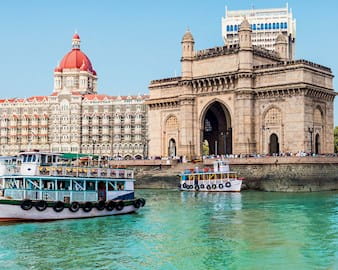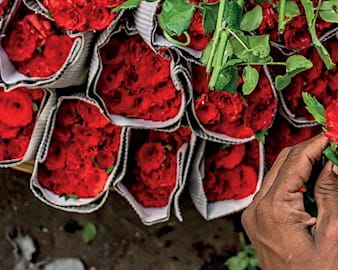
A close-knit alumni network supports its newest members as they settle into life in Mumbai.
- By
- October 10, 2018
- Community

Mumbai’s Booth alumni network is as large, diverse, and energetic as the city itself. Through events such as impromptu beer-and-chat sessions and the annual Pan-India Booth Alumni Retreat (PIBAR), Mumbai’s more than 150 Booth graduates stay connected and serve as the first port of call in India for any Boothie looking for help.
Although Mumbai is India’s financial center, Booth alumni here work not only in the financial services sector but also in retail, healthcare, technology, and even the Hindi film industry, with one graduate having started a film training school. Many Boothies run family businesses, foundations, consultancies, or startups, and some work in the development sector.
The Mumbai Experts
Harpuneet Singh Kapur, ’01, Head of Data Sciences, Business Intelligence, and Operational Excellence, Aeries Technology Group
Luis Miranda, ’89, Founder, IDFC Private Equity and Chairman, CORO and Centre for Civil Society
Venkat Nettimi, ’07, EVP, Head of Strategy and Consumer Insights, Zee Entertainment
Kartik Raja, ’00, Manager, Qosbee
Jerry Rao, ’81, Chairman, Board of Advisors, Centre for Civil Society
Maina Sahi, ’10, Principal, Social Impact and Public Sector Practice, The Boston Consulting Group
Mumbaikar Luis Miranda, ’89, has seen the Booth-Mumbai chapter grow from when it comprised only a handful of members to the thriving, vibrant community it is today. Thirteen years after he returned from the United States in 1989, Miranda got together with fellow alumnus Darius Pandole, ’92, to start IDFC Private Equity, one of India’s largest infrastructure-based private equity funds. Having experienced the network firsthand, Miranda enjoys connecting the dots and getting people together, especially the younger alumni from whom he is eager to learn new things.
“I am amazed at our network’s desire and ability to help one another.”
— Luis Miranda
“We frequently talk on the phone or have meetings early in the morning or late at night to fit everyone’s busy schedule,” he said, adding, “I am amazed at our network’s desire and ability to help one another. Whenever there’s a request to connect or help on one of our WhatsApp groups, within 10 minutes someone will reach out to say, ‘Yes, I can help!’”
Mumbai’s wonderful alumni network is among the main reasons Jerry Rao, ’81, recommends Booth to prospective MBA students. “When someone needs a job or an investor or an introduction to someone, we are there to help,” he said.

Returning to India after a long stint abroad can be tough, and when Harpuneet Singh Kapur, ’01, returned in 2005 after eight years away, the Booth network helped him decode Indian organizations’ hierarchical structures and somewhat indirect style of communication. “You cannot overestimate the value of this kind of help,” he said, adding, “The head of outreach in Mumbai went above and beyond anything I could have expected. It’s great that Booth has that position.” Every time he has looked to move ahead in his career, Kapur said, the Booth network has been his foremost source for connections and help.
The Booth-Mumbai Alumni Club today is more active and close-knit than a decade ago, around when Maina Sahi, ’10, graduated. “From 2010 onward, a lot of graduates chose to return to India right after their degree,” she said. “They’re a younger lot and they are eager to do lots of things.”
Sahi is the former head of the Mumbai alumni chapter, which organizes three to four large events each year. There are some 40 to 45 alumni who are “very close and who come to every event,” Sahi said, “and then there are many smaller gatherings where seven or eight of us meet much more frequently, often with families.”
Sahi passed the baton to Venkat Nettimi, ’07, and Kartik Raja, ’00, who took over as chairpersons of the Booth-Mumbai Alumni Club in March 2018. High on their agenda is increasing the frequency of organized get-togethers to at least once a month, and having more events where families can join in, to make interactions less businesslike and more personal and impactful. “I’m looking to organize a heritage walk or a trail hike with families,” Nettimi said, adding that this year’s PIBAR will be the third where families have been invited.
Raja aims to support women alumni and encourage more women to pursue a degree at Booth. In his experience, alumnae move to India for personal rather than work reasons—either when they’re taking a career break to start a family and need the support they can only get at home, or when their spouse is moving to Mumbai for a job. “We hope to support them to reenter the work stream through our vast network,” Raja said, adding that the club is also “keen to get more Booth women to look at India when weighing career options.”
Last July Chicago Booth Women’s Network hosted its first-ever networking brunch in Mumbai in the hope that “in two to three years we’ll have near gender parity in new admissions,” and in a nod to “our women alumni who punch well above their weight,” said Raja.
Where to Stay: Town Side
Nettimi advised choosing a place to stay that doesn’t involve too much travel to get where you need to go, so as to avoid Mumbai’s intense traffic. His pick is “town side”—the local name for the southernmost parts of Mumbai, including the picturesque Colaba, Cuffe Parade, Fort, and Marine Drive areas that are steeped in history. On the weekend “you could start your day with a morning jog on Marine Drive, and later on take a leisurely walk to visit the area’s art deco buildings, finally catching a musical performance at the newly refurbished Royal Opera House in the evening,” Nettimi added.

The Sweet-Smelling Business Lesson: The Dadar Flower Market
Raja suggested an early morning trip to the flower market in Dadar “for some classic, valuable lessons in supply chain management, inventory management, and product design.” The market vendors open their 20-hour work day by selling cut flowers when they’re fresh; in a few hours, the unsold blooms are fashioned into bouquets and innovatively designed displays; and another few hours later, what still remains gets made into garlands to be sold at temples. “The small businesses there hold lessons for anyone who wants to invest in emerging markets,” Raja said.
The Early-Morning Run: Sanjay Gandhi National Park
This more than 38-square-mile forest is a great place for an early morning walk or run, as well as for a casual day trek or an off-roading bicycle tour. “There is no city of this size anywhere else in the world where you can spot a leopard and 2,400-year-old Buddhist caves,” Miranda said. If you have the time, he recommended signing up for one of the guided nature treks organized by various nongovernmental outfits, such as the popular ones by the Nature Information Center at the park.
The Free Afternoon: Indie Art and Wine Scenes
Home to India’s largest film, music, and fashion industries, Mumbai offers an immersive cultural experience for the curious traveler.
Sahi recommended a stroll through Worli, Bandra, and the former mill areas’ niche art galleries, such as G5A Foundation in Laxmi Mills Estate. There are open-mic events at the clubs antiSOCIAL in Khar and the Hive in Bandra. You could also catch a play or two at Prithvi Theatre on Juhu Church Road or the National Centre for the Performing Arts at Nariman Point.
As a wine connoisseur, what Sahi recommended above all is a two to three hours’ drive out of Mumbai toward the wine-producing city of Nashik to stop for a picnic at any of the small, boutique wineries that dot the region.
The Working Lunch: Street Food
The intrepid foodie would not leave without trying the troika of Mumbai’s favorite street food: chaat (for which Raja recommended Elco restaurant in Bandra West), vadapav (at Ashok Vada Pav stall in Dadar), and pavbhaji (Sardar Pav Bhaji in Tardeo).
If you want to sit down to talk, there are plenty of options. No culinary journey to Mumbai is complete without a meal at one of Mumbai’s Irani cafés, and Kapur recommended Koolar & Co. in Matunga. For local Konkani seafood, he suggested Jai Hind Lunch Home in Bandra.
And if you find yourself here during Ramadan, don’t miss a trip to Mohammed Ali Road for its Mughlai food, Kapur added.